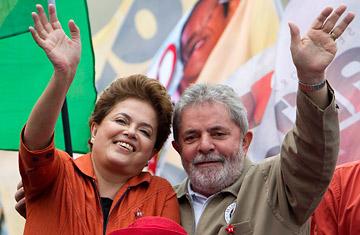
Brazil's Workers Party presidential candidate Dilma Rousseff, left, and President Luiz Inácio Lula da Silva wave to supporters during a campaign rally
The Workers' Party took first place in Brazil's presidential election this past weekend, but its candidate, Dilma Rousseff — the favorite going into the polls — fell short of a first-round victory. She now faces four weeks of intense campaigning for a runoff that opponents and analysts say should provide clearer insight into the future policies of a candidate who has so far avoided articulating her plans for government and simply coasted on the fact that she was the anointed successor of the immensely popular President Luiz Inácio Lula da Silva.
Indeed, with the enthusiastic backing of Lula, Rousseff won 46.9% of the vote — 14.3% more than her closest rival, José Serra of the Brazilian Social Democratic Party, whom she will meet in the runoff. Lula was constitutionally prohibited from running for a third consecutive term, so he handpicked his chief of staff, Rousseff, to continue the progressive policies that made his eight-year administration such a success. Dilma, as she is popularly called, had hoped Lula's overwhelming popularity would be enough to guarantee victory, and she actively avoided detailing her own positions.
Instead, she fell short, partly because of an Internet push by religious conservatives who claimed she would decriminalize abortion, and partly because of two late-breaking influence-trafficking scandals. In one, Workers' Party members were allegedly caught hacking into the classified tax details of Rousseff's opponents; in another, a relative of one of Rousseff's closest advisers was accused of taking money in exchange for help in securing lucrative government contracts. Also, voters unhappy with the lack of a broad debate may have forced a second round in order to better hear the candidates explicate their proposals in detail, experts say.
"I heard many people say they thought Lula and the Dilma campaign were a bit arrogant, and that led them to reject them and force a second round," says Geraldo Monteiro, a political scientist at the State University of Rio de Janeiro. "I also heard many people say, and our own research confirmed this, that they were dissatisfied with the lack of open debate, and that may also have played a part. People want to hear their proposals and ideas more clearly."
Analysts say that in spite of the setback, Dilma's 47%-33% advantage should be more than sufficient to give her a second-round win and warn that although Marina Silva's surprisingly strong showing for the Green Party will give her new prominence, she will not become king- (or queen-) maker. Silva, an activist from the Amazon and a former member of the Workers' Party, got 19% of the ballots on Sunday, Oct. 3, apparently taking crucial votes from Dilma. She is unlikely to endorse either candidate personally. And even though the majority of Silva's supporters are expected to back Serra, Dilma should pick up the Green candidate's votes in the more populous Northeast, where Lula is a hero for his work in reducing income inequality and providing for the poor.
"I think her endorsing Serra may give him a little bit more, but not much. Her voters are better educated and have a higher income, and they are not waiting on her to decide who to support," says Christopher Garman, head of the Latin America practice at the consultancy the Eurasia Group. "For Serra [to win], something new would have to happen — the scandal grows, or she'd have to make huge campaign blunders, or he'd have to convincingly go on attack, and that is a risky strategy."
Brazil's investigative media have gone after the Workers' Party with a vengeance since the scandals broke last month. They are expected to keep searching for more dirt on Dilma and her allies. But even if there are more revelations to come — and most people expect them — experts say that for the scandals to have any decisive effect on Brazil's largely unsophisticated electorate, they would need to include photographs or video of wrongdoing.
A strategy that both candidates may be forced to adopt is one of more direct confrontation. Until now, both Serra and Dilma studiously avoided attacking each other, and neither of them presented detailed proposals to the electorate. Dilma was content to present herself as Lula's heir, and Serra, unable or unwilling to attack a President whose approval ratings regularly reach 80%, seemed unable to articulate an alternative message. Both parties, though, will take heart from Sunday's results, and both will find reasons for optimism. The Workers' Party has the advantage of having won from this same position four and eight years ago; there is no reason for Dilma to stop presenting herself as Lula's true heir.
Serra, meanwhile, will have an equal amount of free television minutes for his party's political broadcasts for the first time since the campaign began, and he should be able to count on support from influential allies in São Paulo and Minas Gerais, the two biggest electoral colleges. Geraldo Alckmin of Serra's Social Democratic Party won the gubernatorial race in São Paulo, and Aecio Neves from the same party was elected Senator in Minas Gerais. Serra will expect both men to devote more time to helping him win votes in those battleground states.
